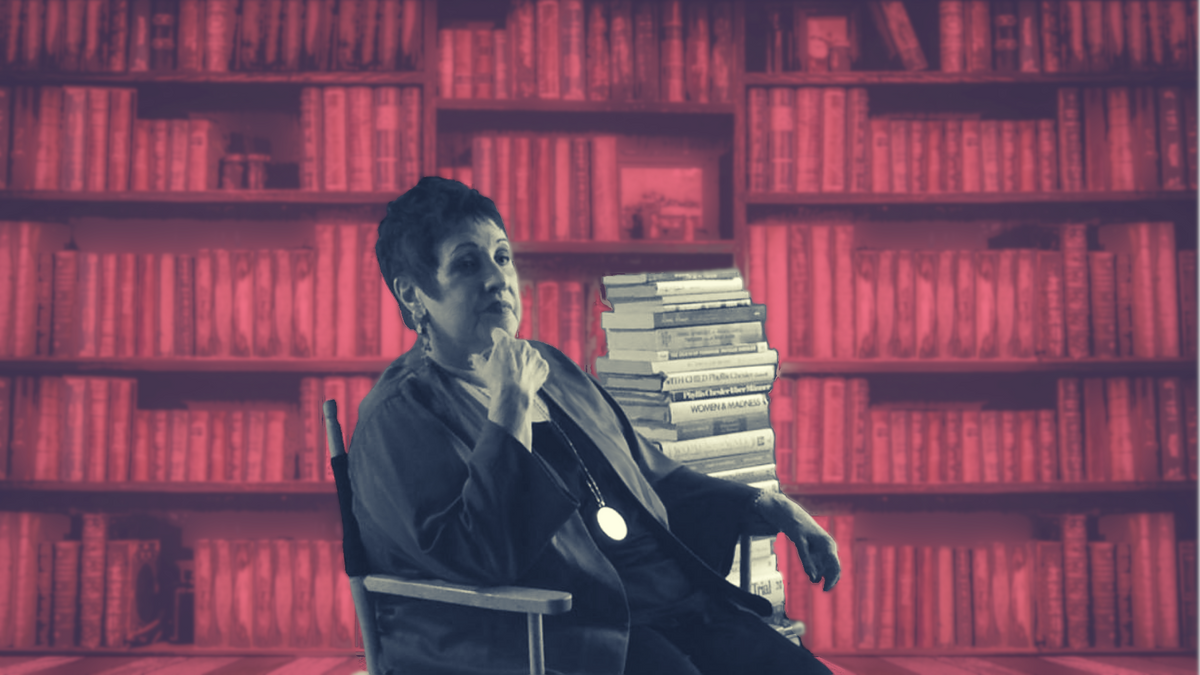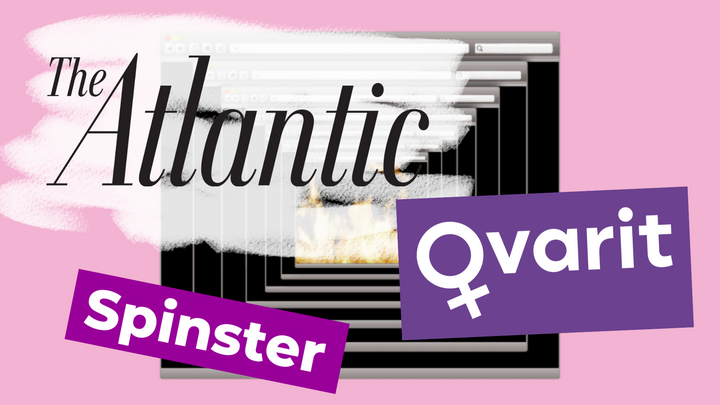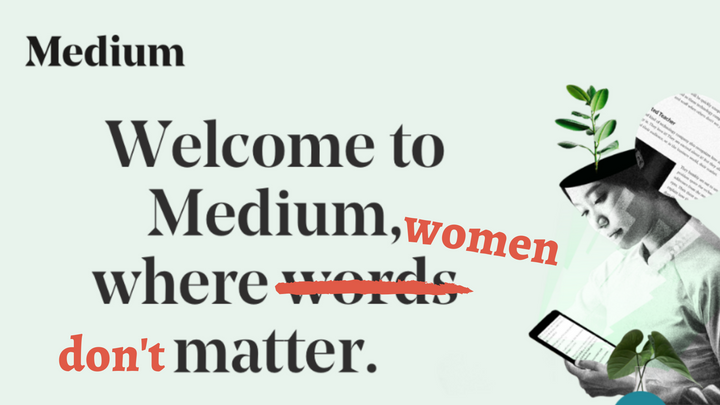Interview: Phyllis Chesler was Cancelled Before It was Cool
Before the "transgender debate," there was Palestine.

Phyllis Chesler is an Emerita Professor of Psychology and Women’s Studies at the College of Staten Island (CUNY) and the author of twenty books, including Women and Madness, Woman’s Inhumanity to Woman, and A Politically Incorrect Feminist. In 1969, she co-founded the Association for Women in Psychology, and in 1974, she co-founded the National Women’s Health Network. She continues to work on political activism and legal work on behalf of women seeking political asylum.
Dana Vitalosova: If we define “cancel culture” as shunning and silencing a person for his or her challenging an ideological orthodoxy of a group, according to your 2003 book "The New Anti-Semitism," it seems to me you were “canceled” way before it became an established term, in the 1980s. Could you explain what had happened?
Phyllis Chesler: “Cancelling” is only potent when it involves being excluded from your own group. From 1967-1980 I was attacked (savaged in reviews of my work, challenges to my professorship, etc.) but mainly by anti-feminist colleagues. Feminists did disagree on issues (pornography, prostitution, lesbianism, child custody, surrogacy, class struggle vs “cultural” feminism) and some engaged in trashing but mainly due to envy and to our own internalized sexism.
I was never ostracized by some—and only some—other feminists until 1980-81 when I stood up for the truth and therefore for Israel and the Jews. I tell a very complex story in my 2018 Memoir “A Politically Incorrect Feminist.” At the time, at issue, was a few feminist leaders fighting for international feminist “territory,” and about how a leftist white feminist believed an allegation of rape should be handled when the victim was a white woman and the rapist was her black African employer at the United Nations. My ordeal took place very long before the #MeToo movement arose. Thus, I learned that feminist principles were applied or not applied depending on who the victim and who the perpetrator was. And whether there was an opportunity in silencing the feminist victim and collaborating with the rapist. Some doors were shut, some backs turned, rumors ran their course.
"I found that I could not get published or reviewed in the same mainstream media as before. And the only sites that would publish my feminist work were deemed unacceptably 'conservative.'"
But I continued my work as a feminist and as a feminist leader. The cold shoulders did not stop me. When I published “Woman’s Inhumanity to Woman” (2002), I ran into some strong feminist opposition. This work was not supported at the time—but over the years, many feminists have thanked me for it. However, in 2003, when I published “The New Anti-Semitism” in which I held the western intelligentsia, including feminist academics and activists, responsible for participating in the kind of Blood Libels that led to pogroms in both the Christian and Muslim worlds, and to the Holocaust—I found that I could not get published or reviewed in the same mainstream media as before. And the only sites that would publish my feminist work were deemed unacceptably “conservative.” I was also challenged on at least two feminist listserv groups for my support for the Jews, Judaism, and Israel and for my early critiques of Islamic gender apartheid. The fact that conservative sites were publishing my very feminist work was held against me. I write a bit about this in “The Death of Feminism.” (2005).
Thus, you are right. I experienced versions of “cancel” culture long before the trans issue came to call; long before hordes of group thinkers shamed and demonized others with the epithet “racist,” “Islamophobe,” and “conservative” if they dared venture an independent idea or fact-based opinion that was not politically correct.
What was the role of anti-Semitism and sexism in this “cancellation”?
Both played a role. Back in 2001 I was insisting that anti-Zionism is anti-Semitism, at least in the 21st century. I was challenged on this even by the editor of “The New Anti-Semitism.” This was the first book I ever wrote that was not reviewed by the New York Times and for which I was never interviewed. Some significant feminist leaders stopped turning to me for support, stopped inviting me to conferences, celebrations, parties. Once, two such women turned their backs to me in a small elevator as we were on our way to a memorial service.
That was pretty shocking and I called one of them to suggest that we at least lay our weapons down when death has taken one of us. “No,” she said, “You are too dangerous to the women’s movement.” She meant that I had accurately exposed someone whose power she relied upon. And that, together with Francine Klagsbrun and Blu Greenberg, I’d exposed Ms. Magazine for its one-time anti-Israel advertising policies. Competition among feminists was as intense as it was denied. Cliques ruled. Mean Girls ruled. We did not have these words or phrases at the time. But, sisterhood also existed. Our honeymoon period was extraordinary. I write about this in “A Politically Incorrect Feminist.”
"'No,' she said, 'You are too dangerous to the women’s movement.'"
In the same book, you describe how, in the late 1970s and 1980s, Palestinians became “romanticized as the most grievously oppressed, and therefore the noblest group in the world” by the left. Don’t you think they were, recently, replaced in this status by “the transgender people”?
Yes. In the West’s romance with redemptive barbarism, terrorists were seen as freedom fighters. Now, transgender activists—the ones who harass and defame radical feminists—are seen as sacred victims, not as bullies.
In your 2003 book you wrote: “In the Islamic world, the most hysterical fantasy often passes for truth. Argue against it - and you may find a price on your head.” Doesn’t this apply, to a certain extent, to our societies now?
Absolutely yes. The belief that a country that has never existed, a sovereign identity that has never existed is the most important country ever (Palestine) is precisely what has allowed people to believe that biological sex and DNA do not exist or are less important than one’s “identity,” which can be male or female, non-binary, etc.
I found this Taslima Nasrin quote in your 2005 book “The Death of Feminism” very enlightening: “To me, the key conflict is between irrational blind faith and rational logical minds. Or between modernity and anti-modernity.” Although her statement was connected to Islam vs. the West, it seems to apply to all host of other issues, such as the “transgender wars.” What can we, as individuals, as feminists, do to bring back logic?
I was arguing for fact-based knowledge, tolerance, and for the celebration of difference as far back as 1972 in “Women and Madness.” And yet we have seen, at least in the academic world and in the media, a steady progression backwards. Orwellian Group Think prevails. Brainwashing and indoctrination prevails. One’s own specialization becomes less and less important and one’s signing onto petitions for or against something that one knows nothing about has become obligatory. In such dangerous and anti-intellectual times, one must dare to read, study, form one’s own fact-based opinions, and dare to stand alone against the gathering storm. I also write about this in “Letters to a Young Feminist.” (1998).
"In such dangerous and anti-intellectual times, one must dare to read, study, form one’s own fact-based opinions, and dare to stand alone against the gathering storm."
In your 2002 book “Woman’s Inhumanity to Woman” you took a closer look at abuse and conflicts between women stemming from female sexism. You found out, for example, that women tend to either idolize or demonize other females. According to the research you cite, we are especially intolerant of differences in other women; whether they’re related to lifestyle, partner choices, or other issues. Why is that?
The brief answer is that women are afraid that “difference” will lead to abandonment and separation. Merging in a dyad is psychologically safest for most of us. We are at our best in one-on-one interactions. But we also know and have experienced how women compete against each other, get a gang to ostracize a chosen target, replace you as an employee, “steal” your husband, your girlfriend, your life work. Learning how to balance our need for intimacy with other women and our bone-deep knowledge about betrayals among women is a very important process. But I suggest reading the book for a more comprehensive answer.
In “Woman’s Inhumanity to Woman” you mention multiple steps we can take to make our female-female relationships better. Is there anything you would add to these steps now, 20 years after the book’s first publication?
Women must learn to respect each other more than liking or loving each other; learn to express our disagreements, even our anger right at the time—and then to let it go. Somehow, we have to give other women as much of a break as we have been forced to give men. We also have to walk away when a relationship is toxic. Above all, resisting our internalized sexism is a daily process, akin to resisting our internalized racism.
In your 2018 memoir, you describe betrayals by other prominent second-wave feminists, as well as totalitarian tendencies in some female-only groups. Did such experiences ever make you consider abandoning the feminist cause? If yes, what made you stick to it? And how did you get off the ground after the betrayals?
I have never abandoned feminism because of human imperfections nor have I abandoned Judaism for this same reason. Like any trauma, one eventually learns to live with it, even forget about it—but in dreams, and at moments, it can all come back to you. Like a war wound it might ache on a rainy day. Somehow, such betrayals, also known as “friendly fire” should never stop a soldier who is committed to using her time on earth to enlighten and rescue others.
"I have never abandoned feminism because of human imperfections nor have I abandoned Judaism for this same reason."
You published your 20th book last year, "Requiem for a Female Serial Killer," about the life of Aileen Wuornos, a prostituted woman turned serial killer. What is your next book going to be about?
What a good question! I am considering reissuing “The Death of Feminism” with a new Introduction since the book was taken out of print some time back. I am also considering an intellectual autobiography, based on all that I’ve published, one about the issues of my time with which I’ve wrestled. Who knows? I might also write a novel.
What books, other than yours, would you recommend all feminists to read?
This is a very important but a very hard question. At the end of my 1998 work, “Letters to a Young Feminist” I have a feminist bibliography which I highly recommend. It does have to be updated. All I’ll say is: Begin with Mary Wollstonecraft and John Stuart Mill and keep on going. It’s all there—but requires a 21st century update.
The generous support of our readers allows 4W to pay our all-female staff and over 50 writers across the globe for original articles and reporting you can’t find anywhere else. Like our work? Become a monthly donor!
Enter your email below to sign in or become a 4W member and join the conversation.
(Already did this? Try refreshing the page!)





Comments